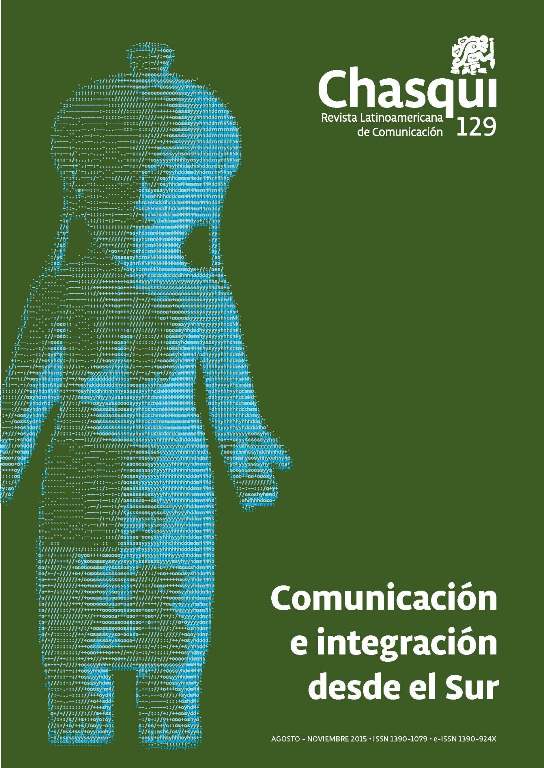The uncomfortable places (or debts and challenges of degrees in Communication)
DOI:
https://doi.org/10.16921/chasqui.v0i129.2615Keywords:
university, Argentina, community communication, digital mediaAbstract
The concern of some Argentine public universities, shaken by new political and technological situations, may be instructive: communication careers transform into degrees in audiovisual media or digital content production; bachelor’s degrees and generic specializations make room for the popular and community communication; courses in digital media and cultural issues develop. It seems, thus, new spaces tolerant to discomfort emerge. It will be necessary to follow step by step these emerging; to look closely at their drifts to determine how discomfort leads to questioning innovation or, on the contrary, it relies on adjustments allowing, again, to get back to comfort.References
Alabarces, P. (2006). Las culturas populares: cuánto queda de resistencia y cuánto falta de poder. En XII Encuentro Latinoamericano de Facultades de Comunicación Social (FELAFACS). Bogotá: Pontificia Universidad Javeriana Bogotá. Recuperado de http://www.javeriana.edu.co/felafacs2006/mesa11/documents/pabloalabarces.pdf.
Alabarces, P. (2012). Transculturas pospopulares. El retorno de las culturas populares en las ciencias sociales latinoamericanas. En Cultura y representaciones sociales. Vol. 7, N° 13. México DF. Recuperado de: http://www.journals.unam.mx/index.php/crs/article/view/32997
Forster, R. (2011). El litigio por la democracia. Buenos Aires: Planeta.
González, J. (1983). Cultura(s) popular(es) hoy”. En Comunicación y Cultura. Vol. 10, N° 10, agosto. México DF: UAM Xochimilco.
López, G. & Ciuffoli, C. (2012). Facebook es el mensaje. Oralidad, escritura y después. Buenos Aires: La Crujía.
Martín-Barbero, J. (1980). Retos a la investigación de la comunicación en América Latina. En G. Cárdenas (coord.). Semana Internacional de la Comunicación. Bogotá DF: Pontifica Universidad Javeriana, Facultad de Comunicación Social.
Mata, M. C. (2011). Comunicación Popular. Continuidades, transformaciones y desafíos. Revista Oficios Terrestres. Año XVII, N° 26. La Plata: Facultad de Periodismo y Comunicación Social, Universidad Nacional de La Plata.
Mattelart, A. (1995). La invención de la comunicación. Barcelona: Bosch.
S. A. (1972). Conclusiones del Seminario Internacional: El papel sociopolítico de los medios de comunicación colectiva para la sociedad de cambio en América Latina (folleto mimeo). San José: ILDIS / CEDAL / CIESPAL.
Simpson Grinberg, J. (1986). (comp.) Comunicación alternativa y cambio social: I. América Latina. México: Premià.
Sistema de Información Cultural de la Argentina (2013). Encuesta Nacional de Consumos Culturales. Recuperado de http://sinca.cultura.gob.ar/sic/publicaciones/libros/EECC.pdf.
Virilio, P. (1996). El complejo de los medios. En El arte del motor. Aceleración y realidad virtual. Buenos Aires: Manantial.
Wolton, D. (1997). Para el público. En D. Dayan (comp.). En busca del público: recepción, televisión, medios. Barcelona: Gedisa.
Downloads
Published
Issue
Section
License
- Authors retain copyright and grant the journal right of first publication with the work simultaneously licensed under a Creative Commons Attribution-NoDerivs License (CC BY-ND) that allows others to share the work with an acknowledgement of the work's authorship and initial publication in this journal.
- Authors are able to enter into separate, additional contractual arrangements for the non-exclusive distribution of the journal's published version of the work (e.g., post it to an institutional repository or publish it in a book), with an acknowledgement of its initial publication in this journal.
- Authors are permitted and encouraged to post their work online.

